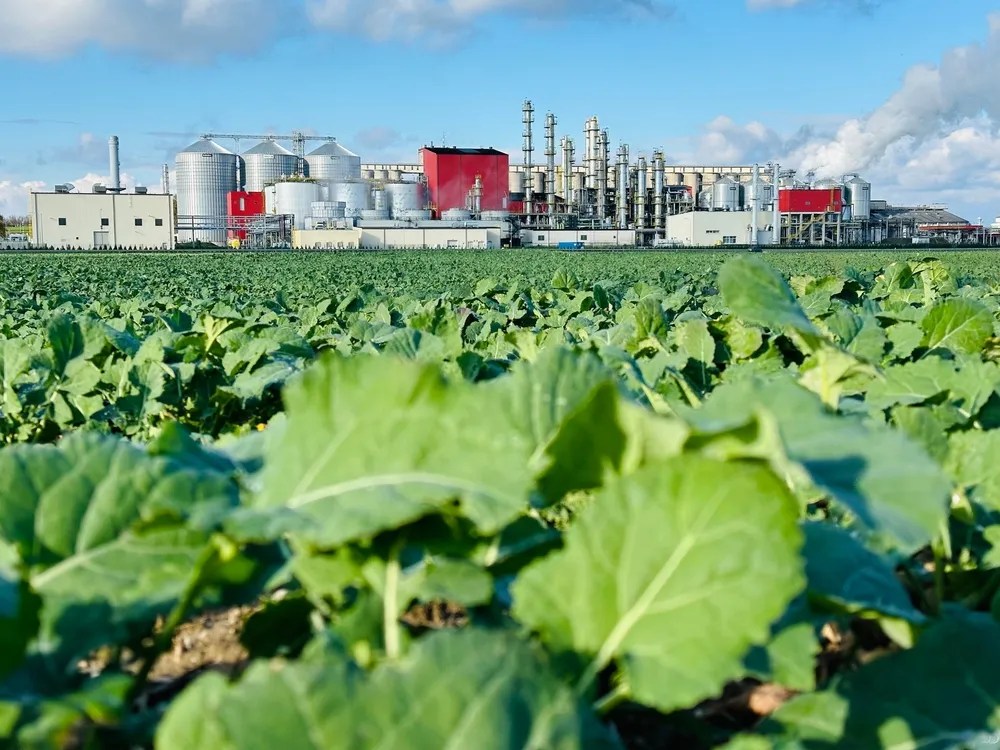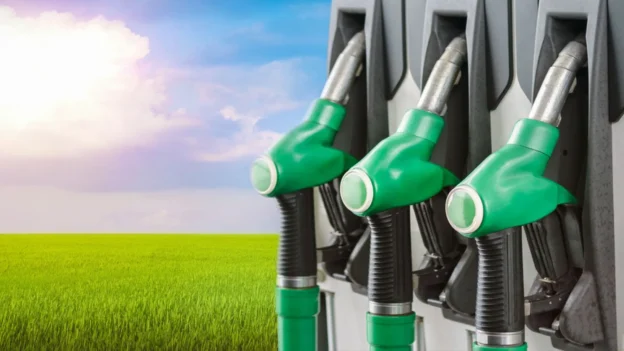Introduction
The transition to more sustainable energy sources is of growing global importance. In this context, biofuels have emerged as a viable and eco-friendly alternative to traditional fossil fuels. Their production and use not only contribute to the reduction of greenhouse gas emissions but also promote rural development and energy independence.
Efficient biofuel distribution at service stations is crucial to maximize their environmental and economic benefits This process involves significant logistical challenges that must be addressed through innovative and sustainable strategies.
The objective of this article is to explore the different biofuel distribution strategies, highlighting the implementation of monitoring technologies, efficient route planning, and the use of alternative fuels. Additionally, the importance of biofuels in the current context will be analyzed, and practical recommendations will be provided to optimize their distribution at service stations.
What are Biofuels?
Biofuels are fuels produced from renewable organic materials, such as plants, agricultural residues, and vegetable oils. Unlike fossil fuels, which take millions of years to form, biofuels can regenerate in short cycles, making them a sustainable and renewable option for energy production.

Among the most common types of biofuels are bioethanol, biodiesel, and biogas. Bioethanol is primarily produced from crops like corn and sugarcane through fermentation processes. Biodiesel, on the other hand, is obtained from vegetable oils or animal fats via transesterification. Biogas is generated from the anaerobic decomposition of organic matter, such as food waste and manure.
The advantages of biofuels over fossil fuels are numerous. Firstly, biofuels have a lower environmental impact, as their combustion releases less carbon dioxide and other pollutants. Additionally, their production and use can reduce dependence on imported fossil fuels, fostering energy security. Biofuels also promote rural development and local economies by generating employment in agricultural and production areas.
Main biofuels used today
Bioethanol: Bioethanol is one of the most widely used biofuels, mainly in the transportation industry. It is produced by fermenting sugars from crops like corn, sugarcane, and other cellulosic materials. Bioethanol is often used as an additive in gasoline, improving combustion and reducing emissions of carbon monoxide and other pollutants.
Biodiesel: Biodiesel is made from vegetable oils, animal fats, and recycled oils through a chemical process called transesterification. This biofuel can be used in traditional diesel engines, either pure or blended with conventional diesel. Biodiesel is biodegradable and produces fewer emissions of carbon dioxide and other pollutants compared to fossil diesel.
Biogas: Biogas is a mixture of gases, mainly methane and carbon dioxide, produced by the anaerobic decomposition of organic matter such as agricultural residues, manure, and municipal waste. This gas can be used to generate electricity, heat, or as fuel for adapted vehicles. Biogas contributes to waste management and the reduction of greenhouse gas emissions.
Advanced or Second-Generation Biofuels: These biofuels are produced from non-food feedstocks, such as forest residues, agricultural residues, and algae. Advanced biofuels include cellulosic ethanol and algal biodiesel, which offer higher energy yields and lower environmental impacts. By using non-edible raw materials, these biofuels do not compete with food production, representing a significant advantage in terms of sustainability.
Importance of biofuels
Contribution to Sustainability: Biofuels represent a sustainable solution in the global energy matrix. Being produced from renewable organic materials, such as agricultural residues and specific crops, biofuels significantly contribute to environmental sustainability. Their use reduces dependence on fossil fuels, whose extraction and consumption have a considerably greater environmental impact.
Reduction of Greenhouse Gas Emissions: One of the main advantages of biofuels is their ability to reduce greenhouse gas (GHG) emissions. During combustion, biofuels release carbon dioxide, but this carbon is the same that was absorbed by plants during their growth, creating a closed carbon cycle. This contrasts with fossil fuels, which release carbon stored for millions of years, contributing to climate change.
Economic and Social Impact: The production and use of biofuels have a positive impact on the economy and society. They generate employment in rural areas, boosting local economic development. Additionally, they can help diversify agricultural income sources and reduce the economic vulnerability of rural communities. In terms of energy security, biofuels allow countries to reduce their dependence on oil imports, strengthening energy and economic autonomy.
Biofuel supply
Supply Chain and Logistics
The biofuel supply chain is a complex process that encompasses several crucial stages from raw material production to final delivery at service stations. It starts with the collection of biomass, which can include energy crops, agricultural residues, forest residues, and used oils. This raw material is transported to biorefineries where it is processed to produce biofuels such as bioethanol, biodiesel, and biogas.
The produced biofuel is then temporarily stored before being transported to distribution points, which can include intermediate storage facilities and final service stations. Logistics are essential to ensure that the biofuel reaches its destination in optimal conditions and efficiently, minimizing both costs and the carbon footprint of the final product.

Challenges in biofuel supply
The supply of biofuels faces several challenges that can affect the efficiency and sustainability of the process. One of the main challenges is the variability in the availability of raw materials, which can depend on seasonal and climatic factors. For example, the production of energy crops can be affected by droughts, floods, and other extreme weather conditions. Additionally, the transportation and storage of biofuels can present difficulties due to their chemical nature and risk of degradation.
Biofuels, such as biodiesel, can be more susceptible to oxidation and microbial contamination, requiring appropriate storage measures to maintain their quality. The existing infrastructure may also not be fully adapted to handle large volumes of biofuels, requiring additional investments in storage tanks, dispensing systems, and specialized transport equipment.
Technologies and tools to improve supply
To optimize the biofuel supply chain, various advanced technologies are being implemented. The use of global positioning systems (GPS) allows better planning and tracking of transport routes, reducing delivery times and associated costs. Transport management systems (TMS) can analyze real-time data on traffic, road conditions, and weather to determine the most efficient and least congested routes.
Additionally, Internet of Things (IoT) technologies and sensors can monitor storage and transport conditions in real-time, ensuring that biofuels maintain their quality. For example, temperature and humidity sensors can alert operators to any deviation from optimal storage conditions, allowing immediate intervention to prevent product degradation. Data analysis platforms can also predict demand patterns and adjust logistics operations accordingly, optimizing resource use and minimizing waste.
Handling and distribution of biofuels
The handling and distribution of biofuels require meticulous attention to detail to ensure that the fuel’s properties are maintained from production to the point of use. Firstly, biofuels must be stored in tanks compatible with their chemical composition to prevent adverse reactions and contamination. The materials of the tanks and pipelines must be resistant to corrosion and oxidative effects of some biofuels, such as biodiesel. During transport, it is crucial to avoid prolonged exposure to extreme environmental conditions that could degrade the fuel.
Real-time monitoring systems, such as level and quality sensors, can provide continuous information on the state of the biofuel during storage and transport. Implementing proper handling practices, such as regular tank cleaning and inventory rotation, is also essential to maintain biofuel quality. Additionally, training personnel in biofuel handling and distribution is fundamental to ensure that correct procedures are followed and risks of contamination and degradation are minimized.
Optimization of distribution
The optimization of biofuel distribution involves not only efficient route planning and the use of advanced technologies but also the implementation of sustainable practices throughout the supply chain. This includes load consolidation to maximize transport vehicle capacity and reduce the number of trips needed.
Using low-emission vehicles and integrating renewable energies, such as solar panels in distribution centers, can further reduce the carbon footprint of biofuel distribution. Collaboration with logistics partners and the establishment of regional distribution networks can also improve supply efficiency and resilience, enabling a faster response to changes in demand and market conditions.
Implementation of monitoring and tracking technology
Benefits of real-time monitoring: The implementation of real-time monitoring technology in biofuel distribution offers numerous benefits, including greater visibility and control over the logistics process. This allows companies to identify and resolve problems immediately, optimizing operations and reducing downtime.

Available technologies for tracking: Various advanced technologies are available for tracking, such as the Internet of Things (IoT) and smart sensors. These technologies enable the real-time collection of data on the condition and location of biofuels during transport and storage. For example, temperature and humidity sensors can ensure that biofuels are kept in optimal conditions, preventing degradation.
Impact on distribution efficiency: The use of these technologies significantly improves distribution efficiency. By providing accurate and updated data, companies can make informed decisions to optimize routes and reduce operating costs. Additionally, the ability to monitor and adjust the process in real-time minimizes the risk of delays and losses, ensuring that biofuels reach their destination safely and efficiently.
Sustainable distribution strategies
Efficient route planning: Efficient route planning is crucial to minimize fuel consumption and greenhouse gas emissions. By using advanced transport management systems, companies can analyze traffic data, weather conditions, and other relevant factors to determine the shortest and least congested routes. This not only reduces environmental impact but also decreases operating costs.
Use of advanced technologies to optimize distribution: The integration of advanced technologies, such as artificial intelligence (AI) and machine learning (ML), allows for the optimization of biofuel distribution. These technologies can predict demand patterns and adjust logistics operations accordingly. Additionally, fleet management systems equipped with GPS provide real-time updates on vehicle location, facilitating distribution management and rapid response to any incident.
Integration of renewable energies in logistics: Adopting renewable energies in distribution logistics is a key strategy for improving sustainability. For example, using electric vehicles and implementing solar-powered charging stations can significantly reduce the carbon footprint of logistics operations. Additionally, installing solar panels in distribution centers and warehouses can provide a clean energy source and reduce reliance on the conventional power grid. These measures not only contribute to environmental sustainability but can also result in long-term economic savings.
Benefits for service stations: Adopting alternative fuels, such as biofuels and renewable gases, offers multiple benefits for service stations. These include diversifying the energy supply, attracting a broader and environmentally conscious customer base. Additionally, alternative fuels can reduce carbon emissions, improving the sustainability image of stations.
Necessary adaptations for storage and distribution: Implementing alternative fuels requires certain adaptations in service stations. This includes installing specialized storage tanks compatible with biofuels and adequate distribution and dispensing systems to prevent contamination and ensure fuel quality. Pumps and pipelines must be resistant to the corrosive effects of some biofuels.
Success cases: Numerous examples of service stations have successfully implemented alternative fuels. In Europe, several networks of stations have introduced E85 (85% bioethanol) and B20 (20% biodiesel) with great acceptance by consumers. These cases demonstrate that, with the necessary technical adjustments and an effective communication strategy, it is possible to integrate alternative fuels in a profitable and sustainable manner.
Biofuel distribution strategies
Efficient distribution models: To optimize the biofuel distribution, it is essential to implement efficient distribution models. This includes using advanced logistics systems to coordinate transport and storage, minimizing transit time and associated costs. Load consolidation and the use of optimized routes are practices that improve efficiency and reduce the carbon footprint.
Collaborations with suppliers and distributors: Establishing solid collaborations with suppliers and distributors is crucial to ensure a constant and high-quality supply of biofuels. Strategic alliances allow for resource sharing, logistics optimization, and improved responsiveness to demand fluctuations. Additionally, these collaborations can facilitate the implementation of innovative technologies throughout the supply chain.
Policies and regulations favoring biofuel distribution: Government policies and regulations play a fundamental role in promoting biofuel distribution. Fiscal incentives, subsidies, and regulations supporting the use of alternative fuels can stimulate investment in infrastructure and technology. Additionally, harmonizing quality and safety standards for biofuels ensures that these products are reliable and competitive in the energy market.
Conclusion
Efficient and sustainable biofuel distribution at service stations is essential to maximize the environmental and economic benefits of this renewable energy source. Implementing advanced monitoring and tracking technologies, planning optimal routes, and using renewable energies are key strategies to optimize biofuel logistics. Additionally, adopting sustainable practices and strategic collaborations with suppliers and distributors is fundamental to ensuring a constant and high-quality supply.
Biofuels not only contribute to reducing greenhouse gas emissions but also promote rural development and improve energy security. By overcoming logistical challenges and leveraging technological innovations, it is possible to create a more efficient and eco-friendly supply chain. Ultimately, adopting biofuels and implementing sustainable distribution strategies represent a crucial step towards a cleaner and self-sufficient energy future, benefiting both the environment and the global economy.
References
Own source

